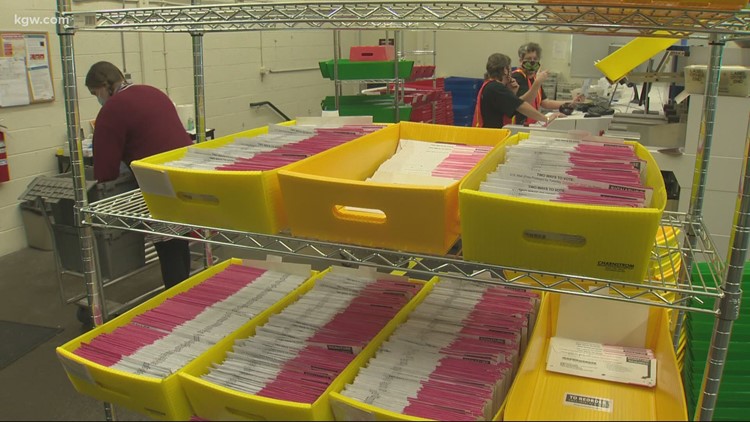PORTLAND, Ore. — It has been almost two weeks since Election Day and many ballots remain challenged and uncounted due to signature verification issues.
Some local Oregon elections that have yet to be called hinge on these challenged ballots that need to be fixed, or "cured."
KGW set out to Verify: What is the deadline for curing ballots?
5 p.m. on Tuesday, Nov. 17 marks the deadline to cure challenged ballots in Oregon.
Typically, ballots are challenged if they are unsigned or the voter's ballot signature does not match their signature on file.
According to a Multnomah County statement, Oregon counties send a "written letter to every voter with a challenged ballot to ensure the voter can resolve any question about their ballot and keep our elections fair and accurate."
Multnomah County also said that "voters with a challenged ballot who are signed up for ballot tracking have received a text message, email or phone call to let them know there is a problem with their ballot that requires follow up.”
Voters can cure their ballots and verify their votes by either signing and returning a new voter registration card with their updated signature or by returning a signed voter statement certifying their vote.
These must be either received by mail or delivered in person to the county election office by 5 p.m. on Nov. 17.
If voters take these steps to cure their challenged ballots, their votes will be counted. If these voters do not cure their ballots, they will be placed in an inactive category and will not receive ballots for future elections.
These inactive voters can re-register up until 8 p.m. on the following election night, but it is easiest to just respond to the original letter from the county elections office, according to Bill Burgess, the county clerk in Marion County.
How often are ballots challenged and cured?
According to Andrea Chiapella, the Secretary of State office’s media contact, in the past few election cycles, only .35% of ballots were unsigned and 1% of ballot signatures were challenged.
This year, in Multnomah County, there are still 3,032 challenged ballots resulting from signature issues.
Clackamas County reported that out of 261,509 ballots processed in the county, there are only 657 ballots with signature issues. That’s about .25% of all ballots.
Voters typically cure ballots at low rates.
In Marion County, Burgess said that just 20% of challenged ballots are typically cured, and only about 1% of ballots have signature issues to begin with. He said that there are often more signature issues in presidential elections, which turn out people who don’t typically vote.
Burgess emphasized that this process of challenging and curing ballots is not new for Oregon.
“A lot of people don't realize that we look at each and every single signature before we determine whether or not we can open that envelope,” Burgess said. “That's been the Oregon way now for 20 years since we started voting by mail.”
Could cured ballots affect election results in Oregon?
Yes, several close Oregon races hinge on these challenged ballots.
In the Gresham mayoral race, as of Monday, Nov. 16, just 60 votes separated the two top candidates, Travis Stovall and Eddy Morales. 558 challenged ballots could decide this race.
Several key Oregon legislature seats also depend on challenged ballots.
In Senate District 27 in Bend, Republican incumbent Tim Knopp is holding on to his seat by less than 2,000 votes in the race against Democratic challenger Eileen Kiely. As of Nov. 13, about 2,300 Deschutes County ballots had yet to be fixed, according to OPB reporting.
And in the race for Senate District 10, which encompasses much of Salem, Democratic challenger Deb Patterson leads Republican incumbent Denyc Boles by 505 votes, according to unofficial results.
Burgess said on Monday evening that, for Senate District 10, Marion County has 409 ballots that are being processed and counted, and they have 531 challenged ballots that have yet to be cured. The senate district also encompasses parts of Polk County, which has its own set of challenged ballots.
If Patterson wins the seat in Senate District 10, Democrats will keep their 18-12 majority over Republicans in the Oregon Senate. Losing one seat will mean losing their supermajority.
Democrats had hoped to secure 20 seats in the Senate and 40 seats in the House to prevent future Republican walkouts. In Oregon, two-thirds of legislators must be present in either the House or Senate to conduct business.
But, Democrats failed to reach that two-thirds mark, and now the status of their supermajority hinges on challenged ballots.
KGW can VERIFY: All challenged ballots must be cured by 5 p.m. on Tuesday, Nov. 17. The final results of these ballots will be released around 5 p.m. on Wednesday, Nov. 18.
Oregon counties will certify the final general election results on Nov. 23, and the state will certify them on Dec. 3.
Do you have something you want us to Verify? Let us know. Email us at Verify@kgw.com



